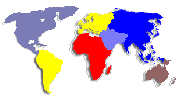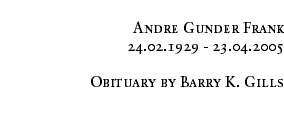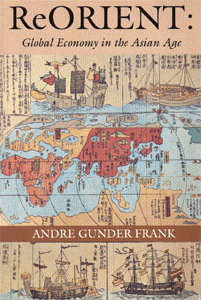|

Awards and Reviews of
Andre Gunder Frank`s ReORIENT: GLOBAL ECONOMY IN THE ASIAN AGE
Berkeley: University of California Press 1998,xxix+416 pp.[pb$19.95]
New Delhi: Sage India 1998 [Rps 495]
Beijing: Central Compilation and Translation Press, February 2000
Hong Kong: Asia 2000, Fantizi [Unreformed] Chinese character ed. in press forthcoming also in Japanese, Korean, German
AWARDS
WORLD HISTORY ASSOCIATION FIRST BOOK PRIZE 1999:
This book has just won the 1999 World History Association Book Award, which was presented at the WHA conference in Victoria, BC, Canada, on June 26, 1999. The choice was unanimous, because we regard this book as being in a class by itself. Its breadth of vision, courageous analysis and apt warning not to let ethnocentrism deter historians from pursuing a global perspective on the past, all make Gunder Frank<s book exceptional and a must read for historians, teachers and students of world history.
The book argues that European hegemony in the modern era did not really emerge until the nineteenth century, and that before that Europe was a rather marginal player in the Eurasian world economy that was centered on China. Only the windfalls of American silver and the Atlantic slave trade enabled Europe to buy its way into the existing world economy and industrialize. Its holistic approach forces historians to look beyond Europe to understand the making of the modern world, and Frank`s attention to historiographic issues is outstanding.
David A. Chappell, Book Review Editor, JOURNAL OF WORLD HISTORY
AMERICAN SOCIOLOGICAL ASSOCIATION
POLITICAL ECONOMY OF WORLD SYSTEMS [PEWS] BOOK AWARD 2000
Winner: Andre Gunder Frank, ReOrient: Global Economy in the Asian Age. Berkeley: University Of California Press, 1998.
Andre Gunder Frank has been turning our thinking upside-down throughout his long and illustrious career. With his work on the development of underdevelopment, he successfully toppled the reigning orthodoxy of modernization theory and forced everyone to reconsider how underdevelopment comes about. The world, and our understanding of it has never been the same. Still working at full bore, fiercely attacking all of our preconceptions, Frank has written yet another masterpiece of provocative sociology. ReOrient calls into question virtually every set of assumptions that has dominated macrosociology since the inception of the discipline. All of the great thinkers of social science, from Adam Smith, to Weber and Marx, to Wallerstein, are put on the chopping block as Frank challenges the very concept of capitalism, and of the emergence of anything special in Europe starting in the 16th century. He argues, and provides tons of evidence, that our most fundamental categories and assumptions are rooted in a Eurocentrism which has blinded us to the long historical dominance of Asia in the global system, and to continuities in global development that negate the idea of any sharp, self-generated break in European history.
Frank argues that our most fundamental categories and assumptions are rooted in a Eurocentrism that has blinded us to the long historical dominance of Asia in the global system. His major contention is that it was Asia, not Europe, that held center stage for most of early modern history before 1800. The economies of Asia were far more »advanced« than any or all of Europe. Only around 1800 did Asian societies lose their dominance in the world economy, a position that came to be occupied by the West during the 19th and 20th centuries. Frank foresees a shift back to Asian dominance in the new century. The books clever title has multiple meanings, including not only reorienting our thinking, with new emphasis on the importance of the »Orient,« but also pointing to the »second coming« of the East.
Whether we agree with everything Frank says in this book or not, it is [a] major intellectual achievement. It forces us to confront the assumptions and concepts that our ideas and research have stood upon for generations. Now the rug is pulled out from under us, and we must question whether all of those »givens« are just cultural biases that we have inherited. This book is like a cold bath that you enter reluctantly, shiver in, and emerge from with a bracing vigor.
What defines a great book? One model is a work that synthesizes everything that we already know. The greatness of ReOrient lies in an opposite principle: that of forcing its readers to revisit everything they have thought and read. We believe such a work deserves to be cherished and honored.
REVIEWS
ReOrient will prove an instant classic, rating among those great books that come along once in a generation, such as with Arnold Toynbee`s The Study of History, William McNeill`s The Rise of the West, and Immanuel Wallerstein`s The World-System as seminal works in world history. For scholars researching the onset of industrialism and the West`s eventual dominance, they will be introduced to a whole new set of questions found in neither Marx nor Weber that require exploration. This book will give world history a research agenda for a generation. Original, contentious, challenging, yet accessible, this is Frank at his best.
JEFFREY SOMMERS, Northeastern University
Amazon.com & BarnesandNoble.com
This iconoclastic book is the culmination of one of the most prolific social historian`s life-long struggle to explain world development. A central idea put forward by the author is that in order to understand history one has to place the analysis squarely into a world-encompassing model of the global economy. Frank provides a much needed perspective that we are »all in the same boat«, that there is »unity in diversity«, and that ideas such as that of a »clash of civilisations« are nonsense. It would be too easy to dismiss it as just »politically correct«. To sum up, »ReORIENT« is a landmark book.
HANS-JUERGEN ENGELBRECHT, Massey University, New Zealand in
International Journal of Social Economics
This will be an extremely important book of sufficient originality and importance to have a major impact. It could not be more ambitious.
KENNETH POMERANZ University of California at Irvine
A book for the millennium can be a landmark book that shapes substantially the scholarship and understanding of the next generation of researchers. It should have an immediate impact.
MARK SELDEN State University of New York
This is a bold new interpretation that creates a distinctive argument to explain Europe`s post-1800 successes. It departs from virtually all other »global« or »world« system perspectives by arguing that Europe was not the central location of economic dynamism in the early modern world (1400-1800) and therefore that »capitalism« was not a unique cultural phenomenon that can explain the differential economic success of Europe over Asia. The author redefines our baseline for assessing the »rise« of Europe. I believe this book could become a benchmark study.
BIN WONG University of California at Irvine
ReORIENT is a stimulating and thoughtful book that shouod be read by all serious studens of the modern world system. [It] has caused great waves of anxiety among social scientists because of his claim that this new pespective on the rise of the West invalidates all our theories of development.
CHRISTOPHER CHASE-DUNN University of California at Riverside in
American Journal of Sociology
We have long been indebted to Andre Gunder Frank for giving us unforgettable concepts. He now gives us the brilliant »Re-Orient«, an incisive bon mot that not only steers us away from Eurocentric history but emphasizes even during the period of the so-called European hegemony, of Asia`s vigor and significance. This book is written in the classic iconoclastic and synthetic style we expect from Frank. In support of this position he has assmbled a prodigious amount of evidence. (His) strong and clear voice has always called upon us to revise. No scholar can afford to ignore this serious book.
JANET ABU-LUGHOD - New School and JOURNAL OF WORLD HISTORY
This is a book with a strong argument supported by a full reading of contemporary research on Asian economic relations; its thesis is presented with verve, passion, and conviction, and its basic claim, that the Asian economies were big and productive is well taken. But it pushes the argument too far
GEORGE MODELSKY University of Washington in The International History Review
Gunder Frank does it again. He turns standard Eurocentric historiography and social theory upside down, as he did many years ago in exposing the facade of economic development. He challenges the experts again, but this time they are quite a different group at least in terms of theory, e.g., ranging from Marx to Braudel. They all got it wrong because they did not see the whole picture, especially how the whole is much more than the sum of its parts. Once again, his argument is clear, organized, and often exciting.
PAT LAUDERDALE, Arizona State University for Amazon.Com
Frank gained his world wide fame by making an argument that caused a revolution in thinking about Third World Development. Well, the same thing is about to happen again, except this time the stakes are much higher. Now it is the theories of the endogenous nature of change in the West that is being challenged. The Wallersteinian world economy did not give rise to the world-system, Frank argues, but the Afroeurasian world system gave rise to the European world economy. To correct the historical fact is to challenge the theoretical scaffolding of everyone from Marx to Weber to Braudel to Wallerstein. Frank shows how [they] got it all wrong. This book is conceptually that important. No other work both provides the exhaustive documentation and the theoretical clarity and conviction of thesis. You get the feel of the interconnectedness of the world in a way ... not felt before and the reminder that according to all received theory this is not supposed to be so. That is the power of this book. A fundamental rethinking absolutely essential to understanding world history.
ALBERT BERGESEN University of Arizona
Andre Gunder Frank`s latest work ReORIENT:Global Economy in the Asian Age definitely is a book with a message. Its author sets out to challenge and overturns the ideas of such influential scholars as Marx, Weber, Polanyi, Rostow, Braudel and Wallerstein. As a matter of fact, almost everybody who has ever touched on the subject.
PEER VRIES Itinerario, University of Leiden
Andre Gunder Frank`s ReORIENT is a heroic effort to reconstruct our conceptions of the world economy in the early modern age. A brilliant theory - Frank`s single-minded, relentless, and compelling organic model achieves coherence and has much to offer.
PETER PERDUE Massachussetts Institute of Technology
If challenging received wisdom is a trademark, this book is written as the mother of all challenges. The immense power of the book rests on the ability to provoke and force one to rethink many facets of history that have been taken for granted for a long long time.
HARBANS MUKHIA Indian Express
ReOrient`s biggest virtue: it forces the reader to at least look differently at world history. This impressive and illuminating analysis sets out to challenge the mother of all orthodoxies that Europe discovered capitalism and industrialisation and that what followed and is happening and will happen is essentially a fallout of this European preeminence.
SAUBHIK CHAKABARTI The Statesman (India)
This is a brave book, brave in the academic as well as the personal sense. It insists on a completely necessary reorientation of academic and political views. It will prove to be compulsory reading.
JACK GOODY St. Johns College, Cambridge in London Times Higher Education Supplement
A work of highest intellectual, social and moral importance. Specialists will welcome the forcefulness, verve, and coherence of Frank`s BIG PICTURE. Much will be completely new to many other historians and social scientists who will have to change their views and rewrite their lectures after they read it.
ANONYMOUS Publisher`s Referee.
ReORIENT deserves to become an instant classic
MARTIN LEWIS Duke University
A fair competitor with Francis Fukuyama`s The End of History
STEVE FULLER University of Durham
 |




